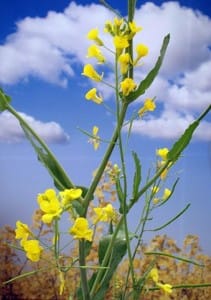Washington Post and AP

SALEM, Ore. — Wet winters and cool, dry summers make Oregon’s Willamette Valley one of the best places on the globe to produce seeds for organic broccoli, cabbage, cauliflower, Brussels sprouts and a variety of other vegetables known as brassicas.
That means the fields south of Portland are also an ideal place to grow canola, another brassica whose seeds can be pressed to extract oil for food or renewable fuel.
Demand for renewable energy, however, has helped fuel a push to grow canola in the region, raising a tense conflict between producers of organic foods and renewable energy in a state that cherishes both.
Seed farmers fear canola would cross-pollinate with their plants, destroying the value of the pure seeds they produce. They’re joined in their fight by organic-food lovers, small-farm advocates and opponents of genetically modified crops.
“This is an existential threat,” said Frank Morton, who farms about 12 acres of specialty seeds in Philomath, about 90 miles southwest of Portland. “If canola comes here, it’s the beginning of the end of this industry.”
Canola proponents say Morton and his colleagues are overreacting. With the right controls, they argue, Canola can co-exist without harming other brassicas. Some wheat and grass-seed farmers are eager to use canola as a rotational crop to interrupt disease and pest cycles. They used to burn their fields at the end of the season, but recent pollution controls have severely limited that option.
“It comes down to good stewardship and cooperating with your neighbors and good management practices,” said Kathy Hadley, who grows grass seed and other crops in the Salem area. “Everyone does those things on a regular basis already, and I feel like, in this specific case, things are being blown out of proportion.”
The state Department of Agriculture has proposed loosening the ban on growing canola in the Willamette Valley, reducing the exclusion zone from 3.7 million acres to 1.7 million, with some restrictions.
The agriculture agency will hold a public hearing Friday to hear from fired-up advocates on both sides of the fight. The agency director is expected to make a final decision by the end of the year.
“They can grow this stuff anywhere else,” said George Kimbrell, a lawyer from the Center for Food Safety representing specialty seed farmers. “It’s just this one area that’s being protected for many very good reasons. It’s not like Oregon or anywhere else is saying you can’t grow your canola. It’s one area.”
Specialty seed farmers grow vegetables not for the food but for their seeds. They’re shipped to farmers around the world, especially in Asia and Europe where there’s higher demand for foods that aren’t genetically modified. This region produces nearly all of the world’s European cabbage, Brussels sprouts, rutabaga and turnip seeds, according to a 2010 study by Oregon State University.

